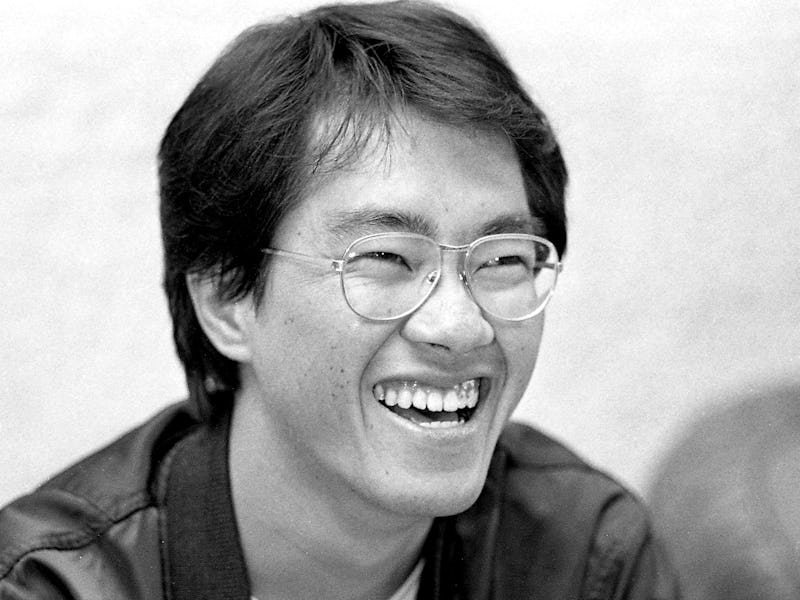It’s Impossible to Imagine Modern Pop Culture Without Akira Toriyama
The hope of the anime universe.

When we think of the impact of Akira Toriyama, the late creator of iconic mega-hit Dragon Ball, it’s sobering to realize what we wouldn’t have without his vital contribution to modern entertainment. Do countless manga series like One Piece or Naruto exist without their creators’ debt to Toriyama? Does anime have its cultural watershed moment in America (and elsewhere in the world) without the lightning strike of Goku’s adventures in Dragon Ball Z? Does the JRPG become as globally recognizable without Toriyama’s art in Dragon Quest and Chrono Trigger? And that’s only scratching the surface of the monumental changes Akira Toriyama brought to pop culture.
Toriyama has passed away at the age of 68 from an acute subdural hematoma. The suddenness has rocked the manga and anime communities and their gigantic fanbases. Titans of their respective industries, like Naruto creator Masashi Kishimoto, One Piece creator Eiichiro Oda, Goku voice actor Masako Nozawa, and Dragon Quest creator Yuji Horii, have offered their thoughts, while millions of his fans around the world have united in remembrance.
Put simply, the pop culture landscape as we know it would not exist without Toriyama. Dragon Ball defined the Golden Age of manga magazine Weekly Shonen Jump, itself arguably the center of the manga world. Before his famous sci-fi fantasy adventure, he’d already had a hit with the comedy manga Dr. Slump, an example of both his broad abilities and the potency of manga itself. Toriyama was far more than a purveyor of loud, fighting guys, and manga is far more than a vehicle for the latest action-packed saga. It can be many things and many genres, and creators like Toriyama have expressed a broader range of talent than they’re given credit for.
Few pop culture figures have become as big as Goku.
Without Toriyama as an anchor, anime likely doesn’t exist on its current international scale. Dragon Ball (especially the sequel series Z) was a hit in Japan, but its greatest legacy is in introducing the medium to new devotees in the United States, Latin America, and beyond. Sprinting to the television after school to catch Goku’s battles on Toonami became a rite of passage for turn-of-the-millennium youths. In 2018, an alleged 10,000 people gathered in Ciudad Juarez to watch Goku take on Jiren in the climax of Dragon Ball Super. Goku debuted as a balloon in the Macy’s Thanksgiving Day Parade that same year, a landmark for anime’s pop culture relevance even if Al Roker couldn’t quite pronounce “Super Saiyan.”
Everyone knew what he meant. The iconography of Dragon Ball has changed our vocabulary, visual and otherwise. Professional athletes openly talk about going “Super Saiyan.” It’s been a joke on Saturday Night Live and a point of reference in rap songs. Toriyama’s work is a household name.
And why shouldn’t it be? We can’t go anywhere without seeing it, even in the realm of American superheroes. The storyboard artist for Man of Steel used Dragon Ball Z as an inspiration for the final hard-hitting battle between Superman and Zod. The recent Superman cartoon My Adventures with Superman is even more open about the franchise’s influence. Hit video games also thrived on his overwhelming presence. Toriyama served as an artist on Dragon Quest and Chrono Trigger, two games that formed the backbone of the entire JRPG genre. Decades later, the still-in-development Dragon Quest XII and Dragon Ball Daima will both feature his art and will likely be two more huge successes.
While most famous for his manga, Toriyama also created the simple yet instantly iconic Slime.
Pop culture wouldn’t be the same without Toriyama, but where would we be? Many fans encountered Dragon Ball at a foundational stage, and behind all of the bulging muscles and fantastical laser attacks was an ingrained message that if we believe in ourselves and others, we can accomplish anything. There are few better lessons to carry forward in life, no matter what age you are.
As a public persona, Akira Toriyama was aloof, often hilariously so (when reminded of a famous character he created in an interview, he responds with, “Oh yeah. I did draw that, didn’t I?”). Those who knew him speak of him with warm reverence as a man who always seemed a little embarrassed to be held in such high regard by so many who would go on to achieve great things themselves. And to his fans, he was one of the greatest ever. Toriyama may be gone now, but his influence is just beginning to unfold.